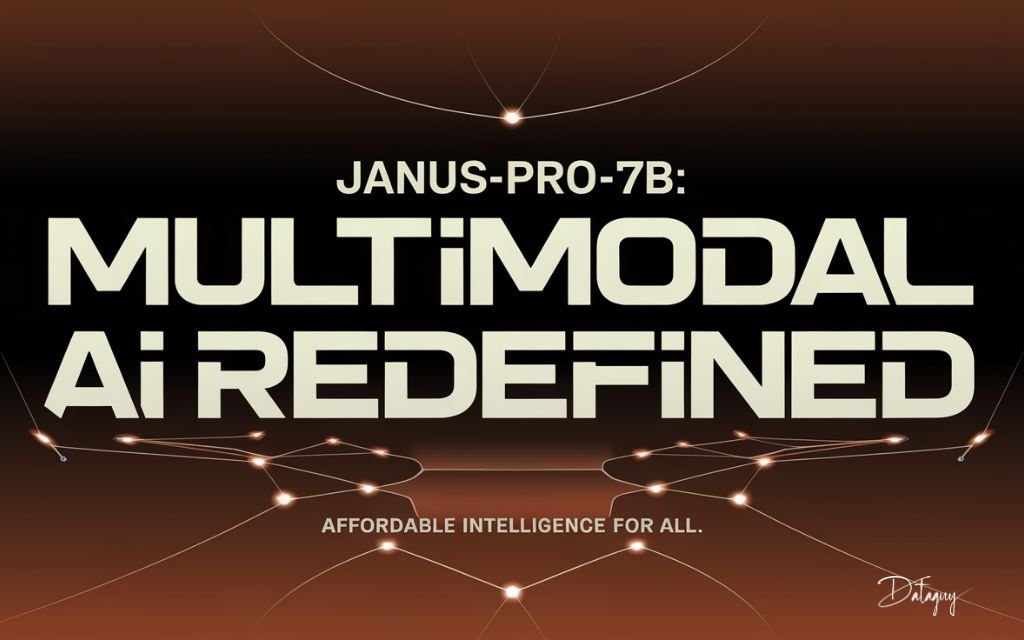Insights Index
ToggleJanus-Pro-7B: Affordable AI Excellence in Multimodal Technology
What is Janus-Pro-7B?
Janus-Pro-7B is a groundbreaking multimodal AI model developed by the Chinese startup DeepSeek. It excels in knowledge acquisition and task generation while offering competitive capabilities at a fraction of the cost of leading models like OpenAI’s DALL-E 3 and Stable Diffusion.
Designed to process both text and images seamlessly, this model represents a significant advancement in AI accessibility.
Key Features of Janus-Pro-7B
1. Multimodal Capabilities
Janus-Pro-7B processes and generates diverse types of data, including text and images. Its performance across benchmarks like GenEval and DPG-Bench positions it as a strong contender against leading models.
2. Innovative Architecture
The model utilizes an autoregressive framework with distinct pathways for visual encoding while maintaining a unified transformer architecture. This innovative design enhances flexibility and performance in multimodal tasks.
3. Technical Specifications
- Parameters: Built with 7 billion parameters.
- Image Resolution: Processes images at 384×384 pixels with a downsample rate of 16.
- Vision Encoder: Incorporates the SigLIP-L vision encoder for advanced image generation.
4. Open Source Availability
Janus-Pro-7B is accessible on platforms like Hugging Face and GitHub under the MIT License. While usage is governed by the DeepSeek Model License, its open-source nature encourages community-driven innovation.
Market Impact
1. Economic Disruption
The launch of Janus-Pro-7B caused an immediate 17% drop in Nvidia’s stock, reflecting its potential to disrupt AI hardware markets by enabling cost-effective alternatives.
2. Industry Impact
The model’s affordability challenges the existing AI business models, offering similar capabilities at a fraction of the cost. Analysts predict wide-scale adoption, particularly among startups and smaller enterprises.
Future Prospects
1. Sector Influence
Janus-Pro-7B is expected to revolutionize industries like fintech by:
- Enhancing customer service through personalized virtual assistants.
- Improving risk management with advanced data analysis.
2. Democratizing AI
By lowering financial barriers, Janus-Pro-7B is set to democratize access to advanced AI technologies, making them available to startups and smaller enterprises.
Comparison with Other AI Models (DALL-E and Stable Diffusion)
1. Performance
Janus-Pro-7B outperforms DALL-E 3 and Stable Diffusion in benchmarks like GenEval and DPG-Bench. However, its image resolution is limited to 384×384 pixels, which is lower than the resolutions supported by its competitors.
2. Model Architecture
- Janus-Pro-7B: Utilizes an autoregressive framework and a unified transformer architecture.
- Competitors: DALL-E 3 and Stable Diffusion focus on generative performance but do not offer the same architectural flexibility.
3. Accessibility
- Janus-Pro-7B: Fully open-source under the MIT License.
- DALL-E 3: Operates on a subscription-based API model.
- Stable Diffusion: Offers both free and paid options, depending on deployment methods.
4. Cost Efficiency
- Janus-Pro-7B: No licensing fees, making it highly cost-effective.
- DALL-E 3: Subscription fees can become expensive for high-volume users.
- Stable Diffusion: Costs vary based on cloud usage versus local deployment.
5. User Experience
- DALL-E 3: Seamless integration within OpenAI’s ecosystem.
- Janus-Pro-7B: Offers flexibility but may require more technical knowledge to implement.
Cost Comparison
1. Janus-Pro-7B
Fully open-source under the MIT License. Users can modify and deploy the model without incurring licensing fees.
2. DALL-E 3
Subscription-based API model with cumulative costs for high-volume usage.
3. Stable Diffusion
Free for local use, but cloud-based deployments or premium features incur additional costs.
Conclusion
Janus-Pro-7B is more than just another AI model—it’s a game-changer. With its multimodal capabilities, innovative architecture, and open-source accessibility, it offers a cost-effective alternative to industry leaders.
While there are trade-offs, such as lower image resolution, the model’s affordability and flexibility make it an appealing choice for businesses and developers alike. As the AI landscape evolves, Janus-Pro-7B is poised to democratize access to cutting-edge technology, ensuring that innovation is within everyone’s reach.

